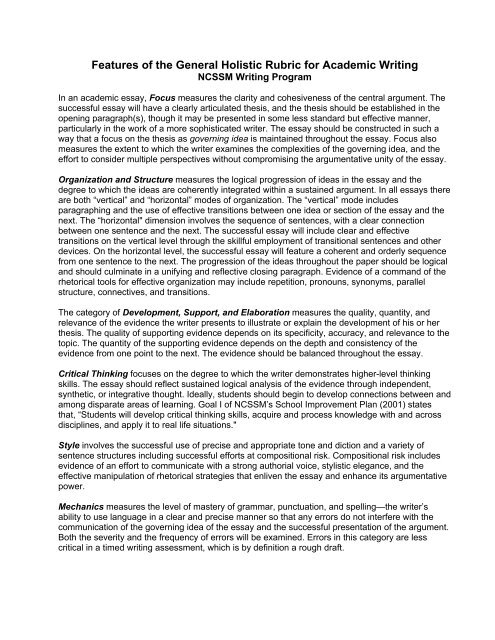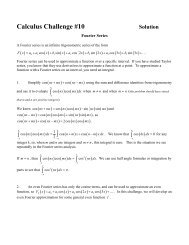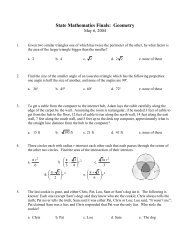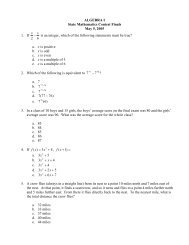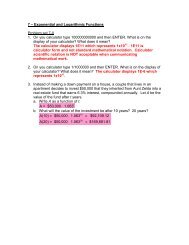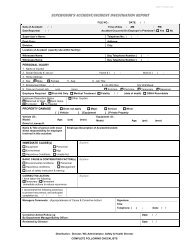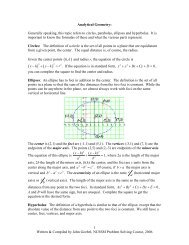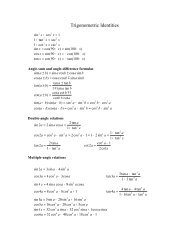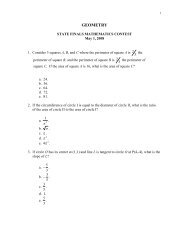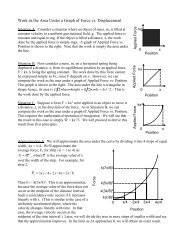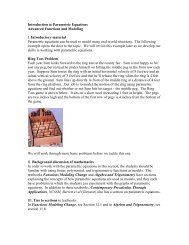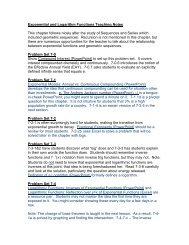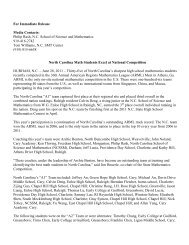Features of the General Holistic Rubric for Academic Writing
Features of the General Holistic Rubric for Academic Writing
Features of the General Holistic Rubric for Academic Writing
Create successful ePaper yourself
Turn your PDF publications into a flip-book with our unique Google optimized e-Paper software.
Score <strong>of</strong> 5An essay in this category is effective, demonstrating reasonably consistent mastery, although it will haveoccasional errors and lapses in quality. A score-point “5” essay should contain many <strong>of</strong> <strong>the</strong> followingcharacteristics:FocusSubject, purpose, and logic maintained throughoutClear, arguable <strong>the</strong>sis:• Germane to topic• Recognizes complexities <strong>of</strong> topic and addresses more than one <strong>of</strong> <strong>the</strong>mOrganization and StructureClear organization and structure:• Introduction sets <strong>for</strong>th purpose with general comments and a clear <strong>the</strong>sis• Closing attempts to unify (is more than a just a restatement <strong>of</strong> <strong>the</strong>sis)• Paragraphs appropriate• Ideas logically presented and related• Coherence and cohesion created through use <strong>of</strong> some effective variety in syntax and varied andeffective transitionsDevelopment, Support, and ElaborationDevelopment <strong>of</strong> most major points with comprehensive and effective use <strong>of</strong> in-depth supporting evidence:• Evidence grounded in relevant and appropriate texts• Evidence predominantly specific, relevant, and accurate with precise and appropriate detailCritical ThinkingEvidence <strong>of</strong> higher-level thinking skills in consistent and insightful ways:• Some logical analysis demonstrating independent or integrative thought, but may be somewhatuneven• Ef<strong>for</strong>t made to develop connections between and among disparate areas <strong>of</strong> learningStyleVaried and appropriate dictionEffective sentence varietyTone appropriate <strong>for</strong> purpose and audience <strong>of</strong> essayEvidence <strong>of</strong> intellectual and verbal adventurousness and self-confidence:• Stylistic elegance partially achieved• Creativity and compositional risk partially successful or partially sustained through effective use <strong>of</strong>figurative language, humor, anecdotes, rhetorical questions, and distinctive authorial voiceMechanicsOnly minor or infrequent grammatical errors that do not detract from persuasiveness <strong>of</strong> essayOnly minor or infrequent spelling and punctuation errors that do not detract from smoothness <strong>of</strong> essay
Score <strong>of</strong> 2An essay in this category is seriously limited, demonstrating little mastery, and is flawed by one or more <strong>of</strong><strong>the</strong> following weaknesses:FocusVague or limited consideration <strong>of</strong> topicOr <strong>the</strong> essay fails to address <strong>the</strong> topic in any way beyond a restatement <strong>of</strong> <strong>the</strong> promptOr may consider multiple and/or unrelated topicsLittle, if any, attempt at a <strong>the</strong>sis anywhere in <strong>the</strong> essayOrganization and StructureMinimal evidence <strong>of</strong> an attempt at structure:• Introduction may require reader inference to establish a purpose• Closing makes only passing reference to topic• Ideas not logically presented or developed• Paragraphs disorganizedDevelopment, Support, and ElaborationLittle development <strong>of</strong> points:• Evidence limited to vague, redundant, or irrelevant generalizations• May present only a list <strong>of</strong> ideas without any evidence or support• Serious errors in content and lack <strong>of</strong> specific evidence detract significantly from <strong>the</strong> development <strong>of</strong>pointsCritical ThinkingLittle, if any, evidence <strong>of</strong> higher-level thinking skillsStyleVery limited vocabulary or incorrect dictionFrequent problems in sentence structureTone inappropriate <strong>for</strong> purpose and audience <strong>of</strong> essayMechanicsFrequent and serious grammatical errors impede communicationFrequent spelling and punctuation errors impede communication
The Scam Wall Street Learned From <strong>the</strong> Mafia | Politics News | Rolling ...http://www.rollingstone.com/politics/news/<strong>the</strong>-scam-wall-street-learned-...8 <strong>of</strong> 17 7/23/2012 2:45 PMOver and over again, jurors heard cooperating witnesses translate <strong>the</strong> damning audiotapes. In one luridsequence, <strong>the</strong> bat-eared, bespectacled CDR broker Evan Zarefsky explained how he helped <strong>the</strong> GE defendantPeter Grimm win a bid <strong>for</strong> a bond put out by <strong>the</strong> Utah Housing Authority. The pair had apparently reamedUtah so many times that it had become a sort <strong>of</strong> inside joke between <strong>the</strong> two <strong>of</strong> <strong>the</strong>m. From a call in August2001:GRIMM: Utah, let's see, how we look on that?ZAREFSKY: Good old Utah!Grimm complains about how much he'll have to pay to win <strong>the</strong> deal. "These levels are really shitty," he says.Zarefsky com<strong>for</strong>ts him. "Well, I can probably save you a couple <strong>of</strong> bucks here," he says.From <strong>the</strong>re, Grimm rattles <strong>of</strong>f numbers, ultimately settling on a bid <strong>of</strong> 351 – 3.51 percent. Zarefsky, in almostmo<strong>the</strong>rly fashion, guides <strong>the</strong> manic Grimm downward, telling him, in code, that his bid is 10 basis points toohigh. "You actually got like a dime in <strong>the</strong>re," Zarefsky says. "You want to come down a dime?"So Grimm comes back with a bid <strong>of</strong> 3.41 percent, which turned out to be <strong>the</strong> winning bid. Utah lost out on 10basis points, GE bilked <strong>the</strong> state out <strong>of</strong> untold sums, and CDR got ano<strong>the</strong>r nice kickback.This, basically, is how a lot <strong>of</strong> <strong>the</strong> calls went. The provider would tentatively <strong>of</strong>fer a number, and <strong>the</strong> brokerwould guide him to a new bid. "You have a little bit <strong>of</strong> room <strong>the</strong>re," he might say, or "That's gonna put youabout a nickel short." Guiding <strong>the</strong> bidders to <strong>the</strong> lowest possible bid was called "figuring out <strong>the</strong> level" orbeing "in <strong>the</strong> market"; obtaining in<strong>for</strong>mation about o<strong>the</strong>r bids was called "giving an indicative" or "seeing <strong>the</strong>market."The brokers and providers used a dizzying array <strong>of</strong> methods <strong>for</strong> rigging deals. In some cases, <strong>the</strong> brokerhelped <strong>the</strong> "winner" by simply excluding o<strong>the</strong>r bidders, who may or may not have been in on <strong>the</strong> scam. Inone hilarious sequence that sounds like something out <strong>of</strong> a wiretap <strong>of</strong> a Little Italy social club, CDRexecutive Dani Naeh tells GE's Steve Goldberg that he's not sure he can guarantee a win on a bid <strong>for</strong> a NewJersey hospital bond. There were too many triple-A-rated companies interested in <strong>the</strong> bond, Naeh explains,and he couldn't control <strong>the</strong>ir bids <strong>the</strong> way he could those <strong>of</strong> <strong>the</strong> lesser, double-A-rated companies he usuallydid business with. "It would be easier <strong>for</strong> us to contact o<strong>the</strong>r providers who were rated double-A and ask<strong>the</strong>m to submit an intentionally losing bid," Naeh testified. He sounded exactly like a mobster, talking about"our guys" and "our friends."In some <strong>of</strong> <strong>the</strong> calls, jurors could hear <strong>the</strong> entirety <strong>of</strong> <strong>the</strong> dirty deals negotiated, including <strong>the</strong> bribe paid backto <strong>the</strong> broker. In one deal involving a bond <strong>for</strong> <strong>the</strong> Port <strong>of</strong> Oakland, Cali<strong>for</strong>nia, Steve Goldberg <strong>of</strong> GE starts toask his pal Stewart Wolmark <strong>of</strong> CDR what kind <strong>of</strong> kickback <strong>the</strong> broker wants <strong>for</strong> rigging <strong>the</strong> deal. Suchconversations about pay<strong>of</strong>fs were so commonplace that Wolmark doesn't even have to wait <strong>for</strong> Goldberg t<strong>of</strong>inish <strong>the</strong> question:GOLDBERG: What are we building in here <strong>for</strong> <strong>the</strong>...WOLMARK: Swap.In his testimony, Wolmark explained that he was asking <strong>for</strong> a swap deal in return <strong>for</strong> rigging <strong>the</strong> bid. "Hewanted to know what we were going to get paid on <strong>the</strong> back end," Wolmark explained.In <strong>the</strong> call, Wolmark and Goldberg start haggling over <strong>the</strong> price <strong>of</strong> CDR's kickback. Wolmark tells Goldberghe only wants what's fair. "Listen, I'm not a chazzer," Wolmark says.
Score <strong>of</strong> 0Essays not written on <strong>the</strong> essay assignment will receive a score <strong>of</strong> zero.


